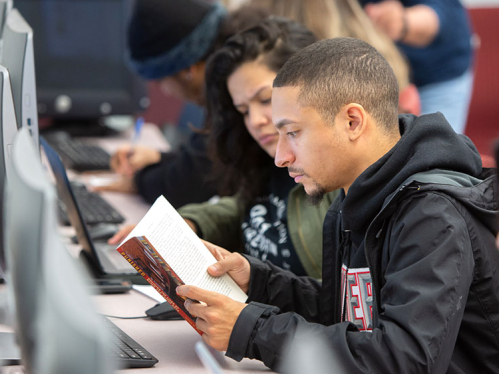
School of Criminal Justice
At the Vanguard of Social Justice Today
In the heart of Newark, the School of Criminal Justice at Rutgers University–Newark brings together a diverse set of students, faculty, and staff dedicated to social justice, community engagement, and public policy.
U.S. News & World Report
UniversityHQ
School of Criminal Justice Turns Fifty
In 1974, at a crucial time of growing public concern about crime and justice, the New Jersey legislature established the School of Criminal Justice at Rutgers University–Newark, to help improve the quality and effectiveness of the justice system in New Jersey and nationally.
In the 50 years since the school's founding, no university-based program has done more to improve justice and promote safety than the faculty and students of Rutgers School of Criminal Justice.

Leadership for a
New Era
Nancy La Vigne, a renowned criminal justice researcher and former leader in the U.S. Department of Justice, has recently become Dean of the Rutgers School of Criminal Justice (SCJ).
La Vigne, a SCJ alumna and previous director of the National Institute of Justice, is committed to supporting a more humane criminal justice system, to change the way people think about crime and justice, and to address inequalities.

Be the Change You Want to See
Students come to learn at the School of Criminal Justice to gain an understanding of the causes and contexts of crime, and the interrelated challenges faced and caused by criminal justice systems. Through a rich, multidisciplinary framework, students at both the undergraduate and graduate levels will gain a wealth of relevant knowledge that can be applied in a professional setting to effect change.
Program Spotlight: Justice Studies (BA)
There is a high demand for professionals who can respond effectively to issues of justice and inequity. The Bachelor of Arts in Justice Studies program provides students with a challenging and exciting course of study that will help them become the best in their fields.
Program graduates will have a deep understanding about
- How justice systems operate
- How justice resources are distributed across different social, racial, and economic groups (and to what effect)
- How inequities in these distributions lead to broad problems of human rights and human dignity

Program Spotlight: Master of Arts in Criminal Justice
The Master of Arts in Criminal Justice program prepares students for positions of leadership and responsibility in government organizations, non-profits, and academic careers. Students will become effective agents of change in their communities through coursework and hands-on experiences.
Classes include contemporary crime, justice, and law enforcement policies and practices, as well as our state-of-the-art training in social science research and methodology.

Student Perspective
Daniela Ovelar hails from Somerville, New Jersey and is pursuing a Bachelor of Science in Criminal Justice. While achieving academic success, the School of Criminal Justice has helped her gain impressive field work experience with two high-profile internships. Ovelar's career goal is to work with a federal agency as a special agent.
Daniela Ovelar, School of Criminal Justice Undergraduate

Expand Your Opportunities
Discover the School of Criminal Justice
The School of Criminal Justice attracts many of the brightest aspiring criminal justice students from right here in Newark and across the world. The school directly contributes to national and international questions about justice through its teaching, scholarship, and public service.





